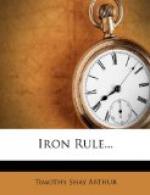“I won’t be talked to in this way!” said Mr. Howland, in an offended tone. “No son of mine shall insult me!”
“A strange insult to a father, for a son to declare himself innocent of a crime falsely laid to his charge,” replied Andrew, with a strong rebuke in his voice. “A true father would be glad—”
“Silence!” again fell harshly from the lips of Mr. Howland. “Silence, I say; I will hear no such language from a son of mine!”
Without a word, Andrew arose, and, retiring from the room, took up his hat and left the house—the relation between him and his father by no means in a better position than it was before. Within a few minutes of ten o’clock the boy returned, and, being admitted, went up to his room without joining the family.
On the next morning, one or two of the daily papers contained an account of Andrew’s arrest, with his father’s name and all the particulars of the transaction. Any one reading this account, with the reporter’s comment, could not help but believe that Andrew was a desperate bad boy, and undoubtedly guilty in design of incendiarism.
“See what a disgrace you have brought upon us!” exclaimed Mr. Howland, flinging a paper, containing this mortifying intelligence in the face of his son.
The boy took up the paper, and read the paragraph referred to with a burning cheek. He made no remark, but sat for some time in a state of profound abstraction. No one guessed the thoughts that were passing through his mind, nor the utter hopelessness that was lying, with a heavy weight, upon his spirit. Before him was the image of Emily. She had seen him with his blood-disfigured face, in the hands of the watchman; and now she would see this slanderous story, and what was worse, believe it!
Some two hours subsequently, while walking along the street, Andrew perceived Emily, within a few paces of him. He looked her steadily in the face, and saw that she saw him; for a quick flush overspread her countenance. But, averting her eyes, she passed him without a further sign of recognition.
At night-fall, the boy did not return to his home.
Anxiously did the time pass with Mrs. Howland until ten o’clock, and yet he was away. Eleven—twelve—one o’clock, pealed on the ear of the watching mother, but he came not. It was all in vain that her husband remonstrated with her. His words passed her unheeded; and she remained waiting and watching, until near the hour of morning, but her waiting and watching were all in vain.
Two days passed—yet there came no tidings of the absent boy. On the third day, Mrs. Howland received the following letter:—




